Globalization of Knowledge: Analysis of Issues and Challenges Report
VerifiedAdded on 2022/11/03
|27
|8480
|296
Report
AI Summary
This report delves into the globalization of knowledge, analyzing its major issues and challenges. It begins by introducing the concept of globalization and its historical context, emphasizing the role of knowledge in various processes. The report then focuses on a video discussing key aspects such as global networks, contextual awareness, and hybrid intelligence, highlighting the impact of the Fourth Industrial Revolution. The analysis covers critical issues like preparing individuals for technological advancements, ethical considerations in knowledge transfer, prioritizing knowledge transfer within organizations, and the application of knowledge in intensive activities. The report examines how globalization affects decision-making by global leaders and the connections between ideas and experts worldwide, offering recommendations on addressing the identified issues and their implications for business organizations.
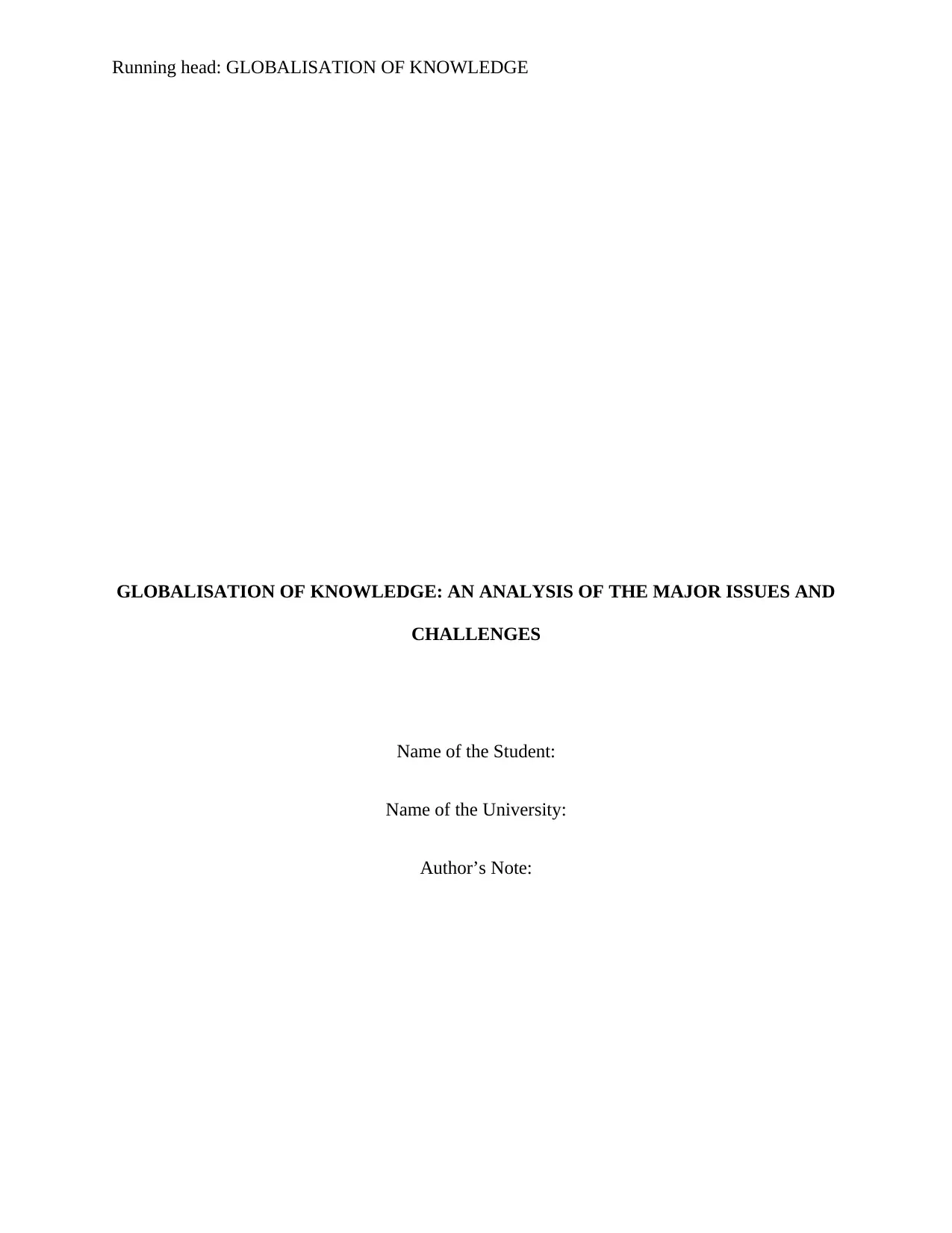
Running head: GLOBALISATION OF KNOWLEDGE
GLOBALISATION OF KNOWLEDGE: AN ANALYSIS OF THE MAJOR ISSUES AND
CHALLENGES
Name of the Student:
Name of the University:
Author’s Note:
GLOBALISATION OF KNOWLEDGE: AN ANALYSIS OF THE MAJOR ISSUES AND
CHALLENGES
Name of the Student:
Name of the University:
Author’s Note:
Paraphrase This Document
Need a fresh take? Get an instant paraphrase of this document with our AI Paraphraser
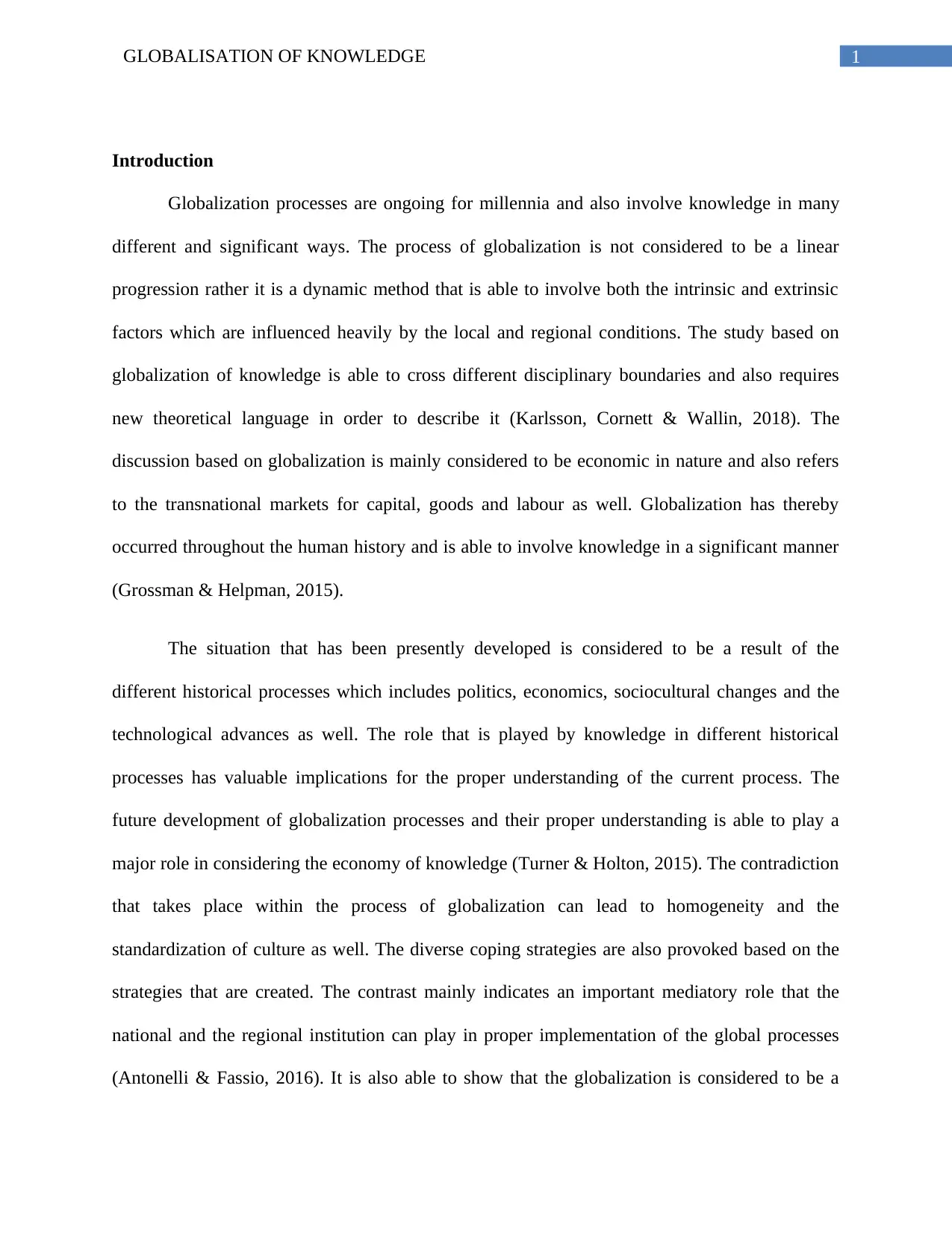
1GLOBALISATION OF KNOWLEDGE
Introduction
Globalization processes are ongoing for millennia and also involve knowledge in many
different and significant ways. The process of globalization is not considered to be a linear
progression rather it is a dynamic method that is able to involve both the intrinsic and extrinsic
factors which are influenced heavily by the local and regional conditions. The study based on
globalization of knowledge is able to cross different disciplinary boundaries and also requires
new theoretical language in order to describe it (Karlsson, Cornett & Wallin, 2018). The
discussion based on globalization is mainly considered to be economic in nature and also refers
to the transnational markets for capital, goods and labour as well. Globalization has thereby
occurred throughout the human history and is able to involve knowledge in a significant manner
(Grossman & Helpman, 2015).
The situation that has been presently developed is considered to be a result of the
different historical processes which includes politics, economics, sociocultural changes and the
technological advances as well. The role that is played by knowledge in different historical
processes has valuable implications for the proper understanding of the current process. The
future development of globalization processes and their proper understanding is able to play a
major role in considering the economy of knowledge (Turner & Holton, 2015). The contradiction
that takes place within the process of globalization can lead to homogeneity and the
standardization of culture as well. The diverse coping strategies are also provoked based on the
strategies that are created. The contrast mainly indicates an important mediatory role that the
national and the regional institution can play in proper implementation of the global processes
(Antonelli & Fassio, 2016). It is also able to show that the globalization is considered to be a
Introduction
Globalization processes are ongoing for millennia and also involve knowledge in many
different and significant ways. The process of globalization is not considered to be a linear
progression rather it is a dynamic method that is able to involve both the intrinsic and extrinsic
factors which are influenced heavily by the local and regional conditions. The study based on
globalization of knowledge is able to cross different disciplinary boundaries and also requires
new theoretical language in order to describe it (Karlsson, Cornett & Wallin, 2018). The
discussion based on globalization is mainly considered to be economic in nature and also refers
to the transnational markets for capital, goods and labour as well. Globalization has thereby
occurred throughout the human history and is able to involve knowledge in a significant manner
(Grossman & Helpman, 2015).
The situation that has been presently developed is considered to be a result of the
different historical processes which includes politics, economics, sociocultural changes and the
technological advances as well. The role that is played by knowledge in different historical
processes has valuable implications for the proper understanding of the current process. The
future development of globalization processes and their proper understanding is able to play a
major role in considering the economy of knowledge (Turner & Holton, 2015). The contradiction
that takes place within the process of globalization can lead to homogeneity and the
standardization of culture as well. The diverse coping strategies are also provoked based on the
strategies that are created. The contrast mainly indicates an important mediatory role that the
national and the regional institution can play in proper implementation of the global processes
(Antonelli & Fassio, 2016). It is also able to show that the globalization is considered to be a
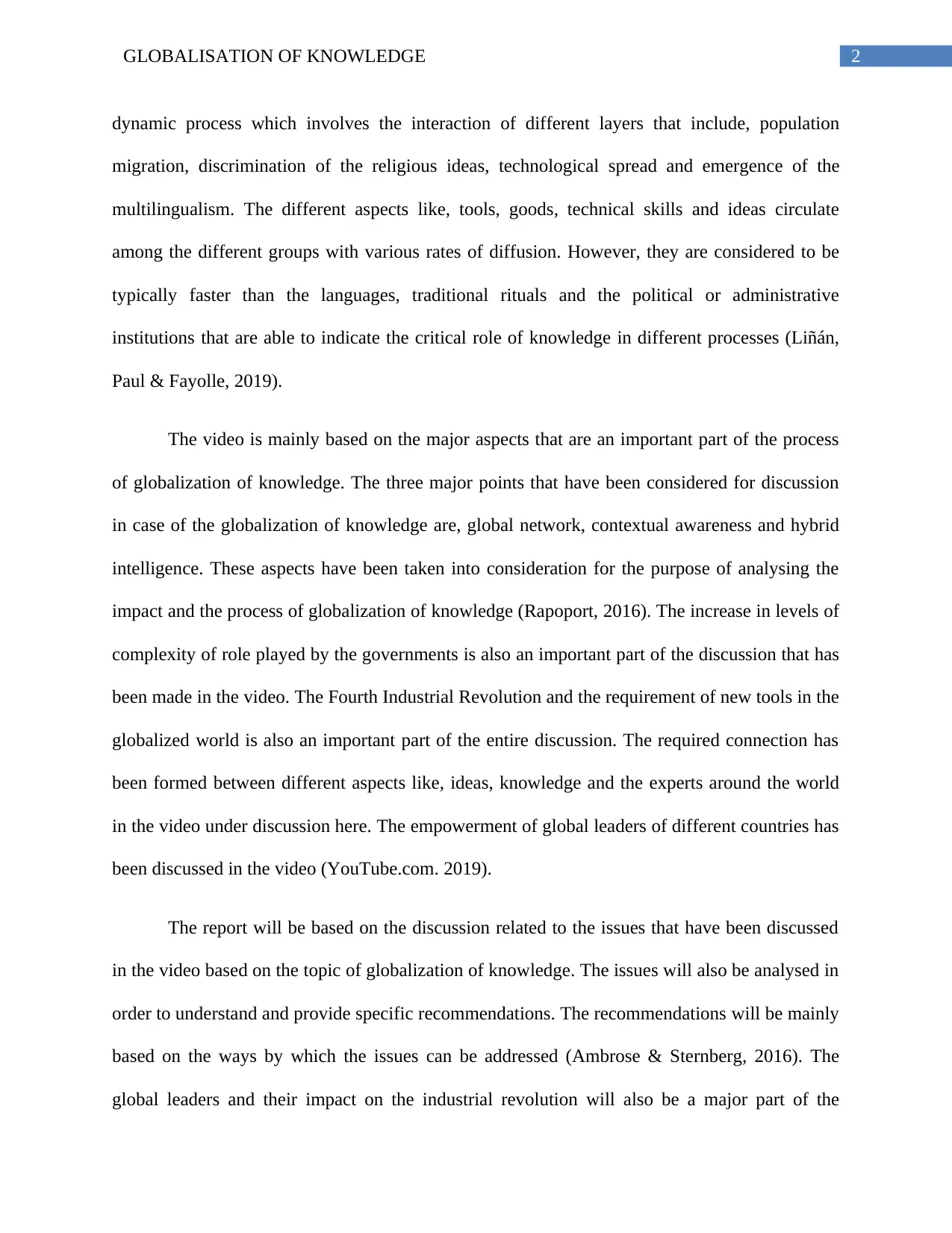
2GLOBALISATION OF KNOWLEDGE
dynamic process which involves the interaction of different layers that include, population
migration, discrimination of the religious ideas, technological spread and emergence of the
multilingualism. The different aspects like, tools, goods, technical skills and ideas circulate
among the different groups with various rates of diffusion. However, they are considered to be
typically faster than the languages, traditional rituals and the political or administrative
institutions that are able to indicate the critical role of knowledge in different processes (Liñán,
Paul & Fayolle, 2019).
The video is mainly based on the major aspects that are an important part of the process
of globalization of knowledge. The three major points that have been considered for discussion
in case of the globalization of knowledge are, global network, contextual awareness and hybrid
intelligence. These aspects have been taken into consideration for the purpose of analysing the
impact and the process of globalization of knowledge (Rapoport, 2016). The increase in levels of
complexity of role played by the governments is also an important part of the discussion that has
been made in the video. The Fourth Industrial Revolution and the requirement of new tools in the
globalized world is also an important part of the entire discussion. The required connection has
been formed between different aspects like, ideas, knowledge and the experts around the world
in the video under discussion here. The empowerment of global leaders of different countries has
been discussed in the video (YouTube.com. 2019).
The report will be based on the discussion related to the issues that have been discussed
in the video based on the topic of globalization of knowledge. The issues will also be analysed in
order to understand and provide specific recommendations. The recommendations will be mainly
based on the ways by which the issues can be addressed (Ambrose & Sternberg, 2016). The
global leaders and their impact on the industrial revolution will also be a major part of the
dynamic process which involves the interaction of different layers that include, population
migration, discrimination of the religious ideas, technological spread and emergence of the
multilingualism. The different aspects like, tools, goods, technical skills and ideas circulate
among the different groups with various rates of diffusion. However, they are considered to be
typically faster than the languages, traditional rituals and the political or administrative
institutions that are able to indicate the critical role of knowledge in different processes (Liñán,
Paul & Fayolle, 2019).
The video is mainly based on the major aspects that are an important part of the process
of globalization of knowledge. The three major points that have been considered for discussion
in case of the globalization of knowledge are, global network, contextual awareness and hybrid
intelligence. These aspects have been taken into consideration for the purpose of analysing the
impact and the process of globalization of knowledge (Rapoport, 2016). The increase in levels of
complexity of role played by the governments is also an important part of the discussion that has
been made in the video. The Fourth Industrial Revolution and the requirement of new tools in the
globalized world is also an important part of the entire discussion. The required connection has
been formed between different aspects like, ideas, knowledge and the experts around the world
in the video under discussion here. The empowerment of global leaders of different countries has
been discussed in the video (YouTube.com. 2019).
The report will be based on the discussion related to the issues that have been discussed
in the video based on the topic of globalization of knowledge. The issues will also be analysed in
order to understand and provide specific recommendations. The recommendations will be mainly
based on the ways by which the issues can be addressed (Ambrose & Sternberg, 2016). The
global leaders and their impact on the industrial revolution will also be a major part of the
⊘ This is a preview!⊘
Do you want full access?
Subscribe today to unlock all pages.

Trusted by 1+ million students worldwide
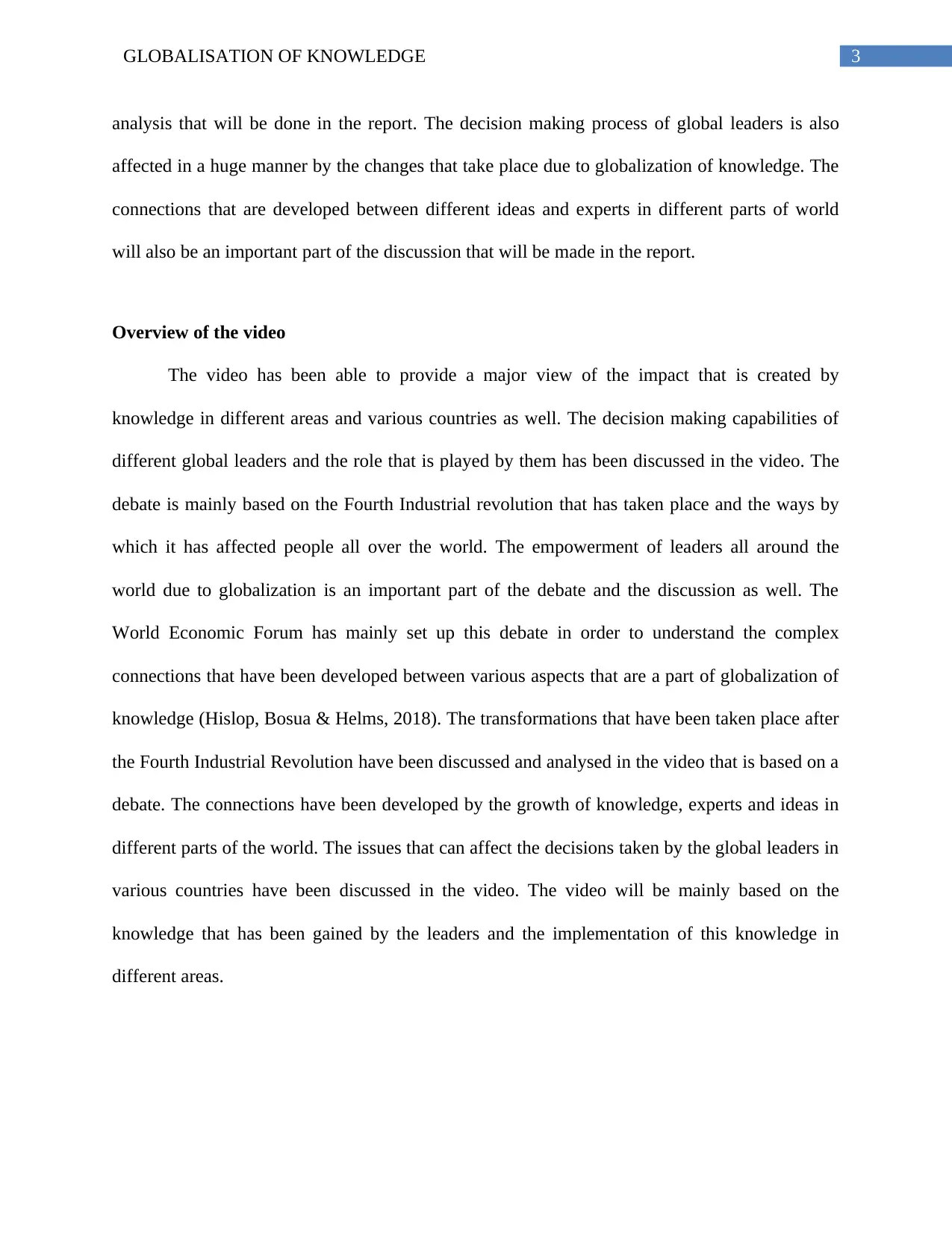
3GLOBALISATION OF KNOWLEDGE
analysis that will be done in the report. The decision making process of global leaders is also
affected in a huge manner by the changes that take place due to globalization of knowledge. The
connections that are developed between different ideas and experts in different parts of world
will also be an important part of the discussion that will be made in the report.
Overview of the video
The video has been able to provide a major view of the impact that is created by
knowledge in different areas and various countries as well. The decision making capabilities of
different global leaders and the role that is played by them has been discussed in the video. The
debate is mainly based on the Fourth Industrial revolution that has taken place and the ways by
which it has affected people all over the world. The empowerment of leaders all around the
world due to globalization is an important part of the debate and the discussion as well. The
World Economic Forum has mainly set up this debate in order to understand the complex
connections that have been developed between various aspects that are a part of globalization of
knowledge (Hislop, Bosua & Helms, 2018). The transformations that have been taken place after
the Fourth Industrial Revolution have been discussed and analysed in the video that is based on a
debate. The connections have been developed by the growth of knowledge, experts and ideas in
different parts of the world. The issues that can affect the decisions taken by the global leaders in
various countries have been discussed in the video. The video will be mainly based on the
knowledge that has been gained by the leaders and the implementation of this knowledge in
different areas.
analysis that will be done in the report. The decision making process of global leaders is also
affected in a huge manner by the changes that take place due to globalization of knowledge. The
connections that are developed between different ideas and experts in different parts of world
will also be an important part of the discussion that will be made in the report.
Overview of the video
The video has been able to provide a major view of the impact that is created by
knowledge in different areas and various countries as well. The decision making capabilities of
different global leaders and the role that is played by them has been discussed in the video. The
debate is mainly based on the Fourth Industrial revolution that has taken place and the ways by
which it has affected people all over the world. The empowerment of leaders all around the
world due to globalization is an important part of the debate and the discussion as well. The
World Economic Forum has mainly set up this debate in order to understand the complex
connections that have been developed between various aspects that are a part of globalization of
knowledge (Hislop, Bosua & Helms, 2018). The transformations that have been taken place after
the Fourth Industrial Revolution have been discussed and analysed in the video that is based on a
debate. The connections have been developed by the growth of knowledge, experts and ideas in
different parts of the world. The issues that can affect the decisions taken by the global leaders in
various countries have been discussed in the video. The video will be mainly based on the
knowledge that has been gained by the leaders and the implementation of this knowledge in
different areas.
Paraphrase This Document
Need a fresh take? Get an instant paraphrase of this document with our AI Paraphraser
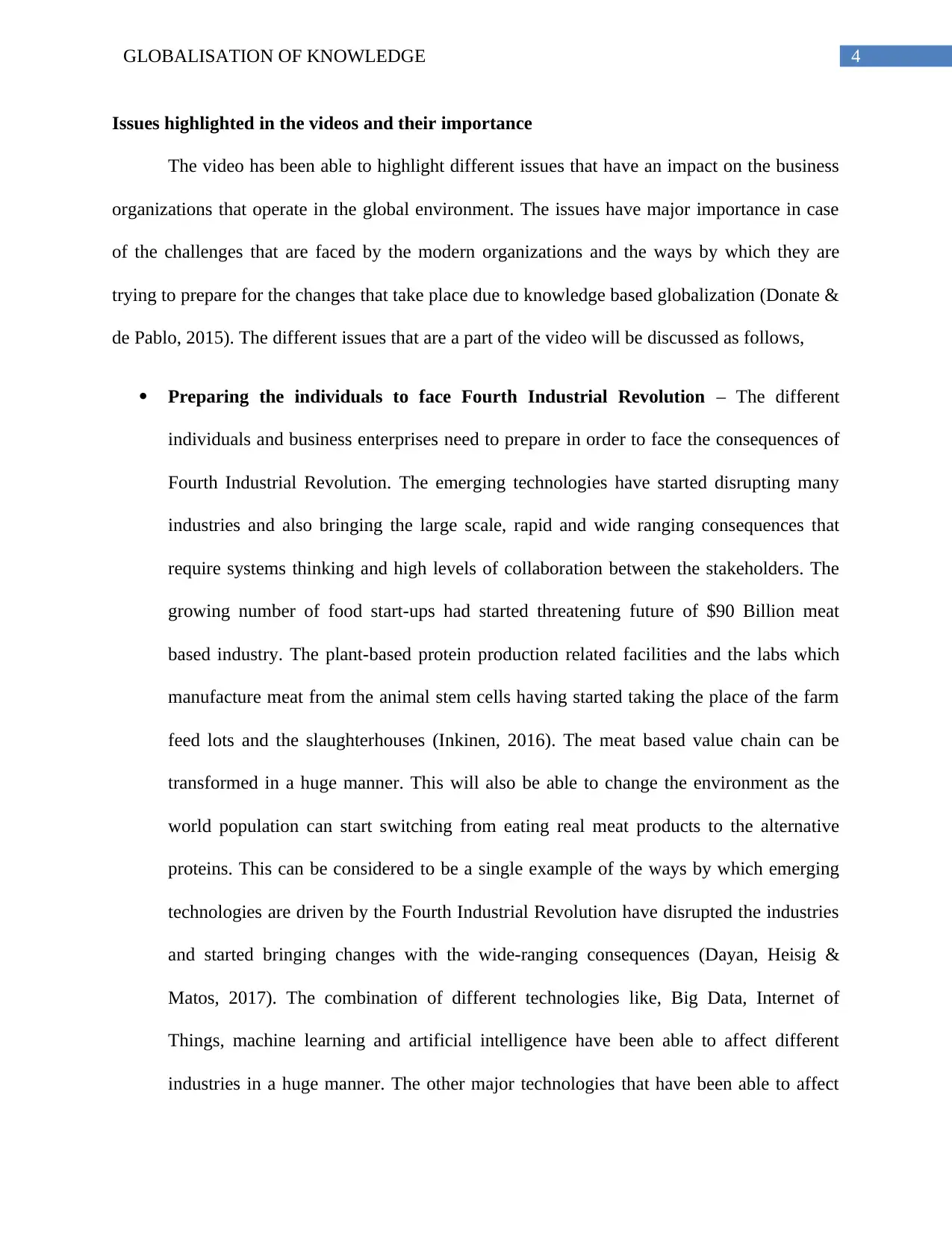
4GLOBALISATION OF KNOWLEDGE
Issues highlighted in the videos and their importance
The video has been able to highlight different issues that have an impact on the business
organizations that operate in the global environment. The issues have major importance in case
of the challenges that are faced by the modern organizations and the ways by which they are
trying to prepare for the changes that take place due to knowledge based globalization (Donate &
de Pablo, 2015). The different issues that are a part of the video will be discussed as follows,
Preparing the individuals to face Fourth Industrial Revolution – The different
individuals and business enterprises need to prepare in order to face the consequences of
Fourth Industrial Revolution. The emerging technologies have started disrupting many
industries and also bringing the large scale, rapid and wide ranging consequences that
require systems thinking and high levels of collaboration between the stakeholders. The
growing number of food start-ups had started threatening future of $90 Billion meat
based industry. The plant-based protein production related facilities and the labs which
manufacture meat from the animal stem cells having started taking the place of the farm
feed lots and the slaughterhouses (Inkinen, 2016). The meat based value chain can be
transformed in a huge manner. This will also be able to change the environment as the
world population can start switching from eating real meat products to the alternative
proteins. This can be considered to be a single example of the ways by which emerging
technologies are driven by the Fourth Industrial Revolution have disrupted the industries
and started bringing changes with the wide-ranging consequences (Dayan, Heisig &
Matos, 2017). The combination of different technologies like, Big Data, Internet of
Things, machine learning and artificial intelligence have been able to affect different
industries in a huge manner. The other major technologies that have been able to affect
Issues highlighted in the videos and their importance
The video has been able to highlight different issues that have an impact on the business
organizations that operate in the global environment. The issues have major importance in case
of the challenges that are faced by the modern organizations and the ways by which they are
trying to prepare for the changes that take place due to knowledge based globalization (Donate &
de Pablo, 2015). The different issues that are a part of the video will be discussed as follows,
Preparing the individuals to face Fourth Industrial Revolution – The different
individuals and business enterprises need to prepare in order to face the consequences of
Fourth Industrial Revolution. The emerging technologies have started disrupting many
industries and also bringing the large scale, rapid and wide ranging consequences that
require systems thinking and high levels of collaboration between the stakeholders. The
growing number of food start-ups had started threatening future of $90 Billion meat
based industry. The plant-based protein production related facilities and the labs which
manufacture meat from the animal stem cells having started taking the place of the farm
feed lots and the slaughterhouses (Inkinen, 2016). The meat based value chain can be
transformed in a huge manner. This will also be able to change the environment as the
world population can start switching from eating real meat products to the alternative
proteins. This can be considered to be a single example of the ways by which emerging
technologies are driven by the Fourth Industrial Revolution have disrupted the industries
and started bringing changes with the wide-ranging consequences (Dayan, Heisig &
Matos, 2017). The combination of different technologies like, Big Data, Internet of
Things, machine learning and artificial intelligence have been able to affect different
industries in a huge manner. The other major technologies that have been able to affect
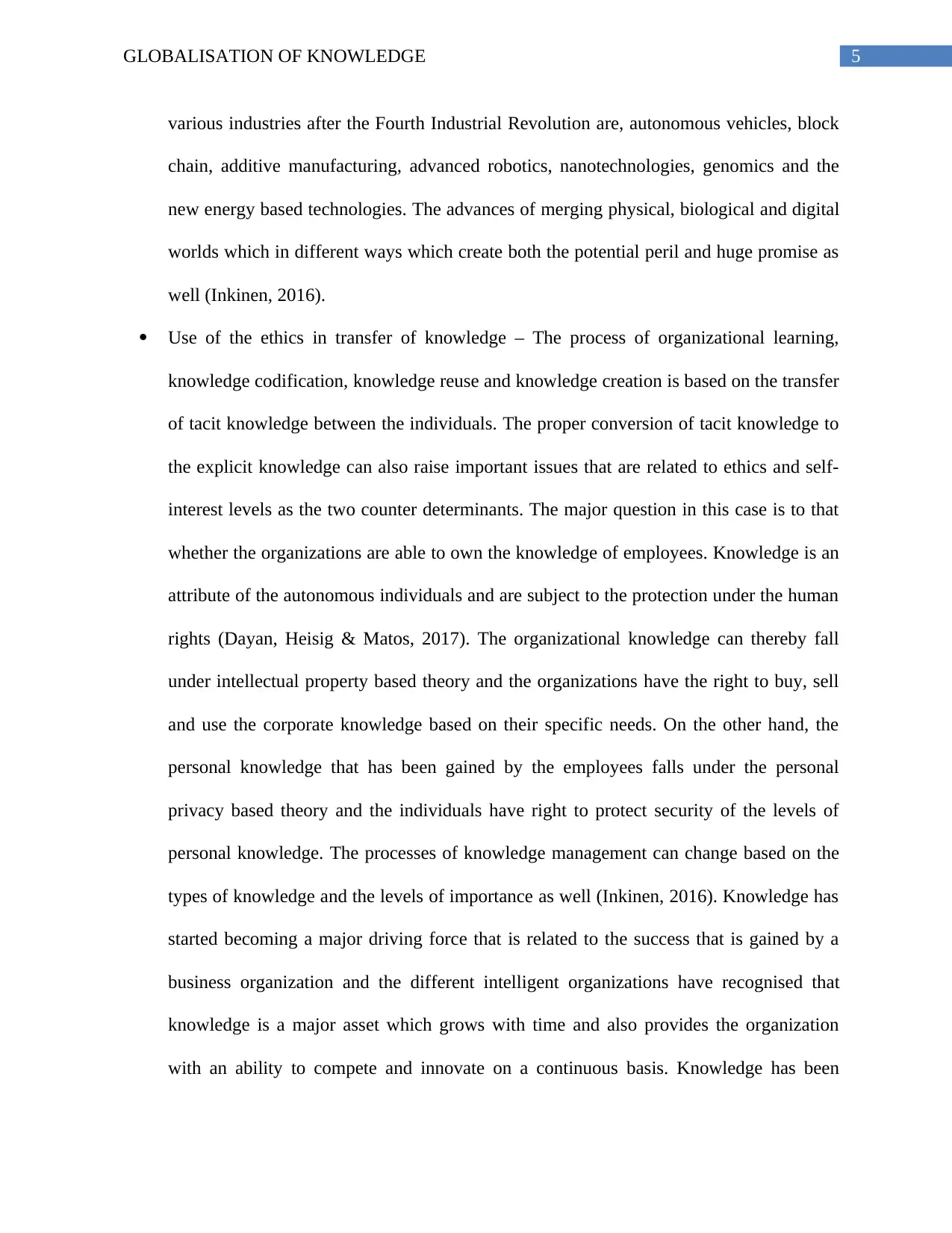
5GLOBALISATION OF KNOWLEDGE
various industries after the Fourth Industrial Revolution are, autonomous vehicles, block
chain, additive manufacturing, advanced robotics, nanotechnologies, genomics and the
new energy based technologies. The advances of merging physical, biological and digital
worlds which in different ways which create both the potential peril and huge promise as
well (Inkinen, 2016).
Use of the ethics in transfer of knowledge – The process of organizational learning,
knowledge codification, knowledge reuse and knowledge creation is based on the transfer
of tacit knowledge between the individuals. The proper conversion of tacit knowledge to
the explicit knowledge can also raise important issues that are related to ethics and self-
interest levels as the two counter determinants. The major question in this case is to that
whether the organizations are able to own the knowledge of employees. Knowledge is an
attribute of the autonomous individuals and are subject to the protection under the human
rights (Dayan, Heisig & Matos, 2017). The organizational knowledge can thereby fall
under intellectual property based theory and the organizations have the right to buy, sell
and use the corporate knowledge based on their specific needs. On the other hand, the
personal knowledge that has been gained by the employees falls under the personal
privacy based theory and the individuals have right to protect security of the levels of
personal knowledge. The processes of knowledge management can change based on the
types of knowledge and the levels of importance as well (Inkinen, 2016). Knowledge has
started becoming a major driving force that is related to the success that is gained by a
business organization and the different intelligent organizations have recognised that
knowledge is a major asset which grows with time and also provides the organization
with an ability to compete and innovate on a continuous basis. Knowledge has been
various industries after the Fourth Industrial Revolution are, autonomous vehicles, block
chain, additive manufacturing, advanced robotics, nanotechnologies, genomics and the
new energy based technologies. The advances of merging physical, biological and digital
worlds which in different ways which create both the potential peril and huge promise as
well (Inkinen, 2016).
Use of the ethics in transfer of knowledge – The process of organizational learning,
knowledge codification, knowledge reuse and knowledge creation is based on the transfer
of tacit knowledge between the individuals. The proper conversion of tacit knowledge to
the explicit knowledge can also raise important issues that are related to ethics and self-
interest levels as the two counter determinants. The major question in this case is to that
whether the organizations are able to own the knowledge of employees. Knowledge is an
attribute of the autonomous individuals and are subject to the protection under the human
rights (Dayan, Heisig & Matos, 2017). The organizational knowledge can thereby fall
under intellectual property based theory and the organizations have the right to buy, sell
and use the corporate knowledge based on their specific needs. On the other hand, the
personal knowledge that has been gained by the employees falls under the personal
privacy based theory and the individuals have right to protect security of the levels of
personal knowledge. The processes of knowledge management can change based on the
types of knowledge and the levels of importance as well (Inkinen, 2016). Knowledge has
started becoming a major driving force that is related to the success that is gained by a
business organization and the different intelligent organizations have recognised that
knowledge is a major asset which grows with time and also provides the organization
with an ability to compete and innovate on a continuous basis. Knowledge has been
⊘ This is a preview!⊘
Do you want full access?
Subscribe today to unlock all pages.

Trusted by 1+ million students worldwide
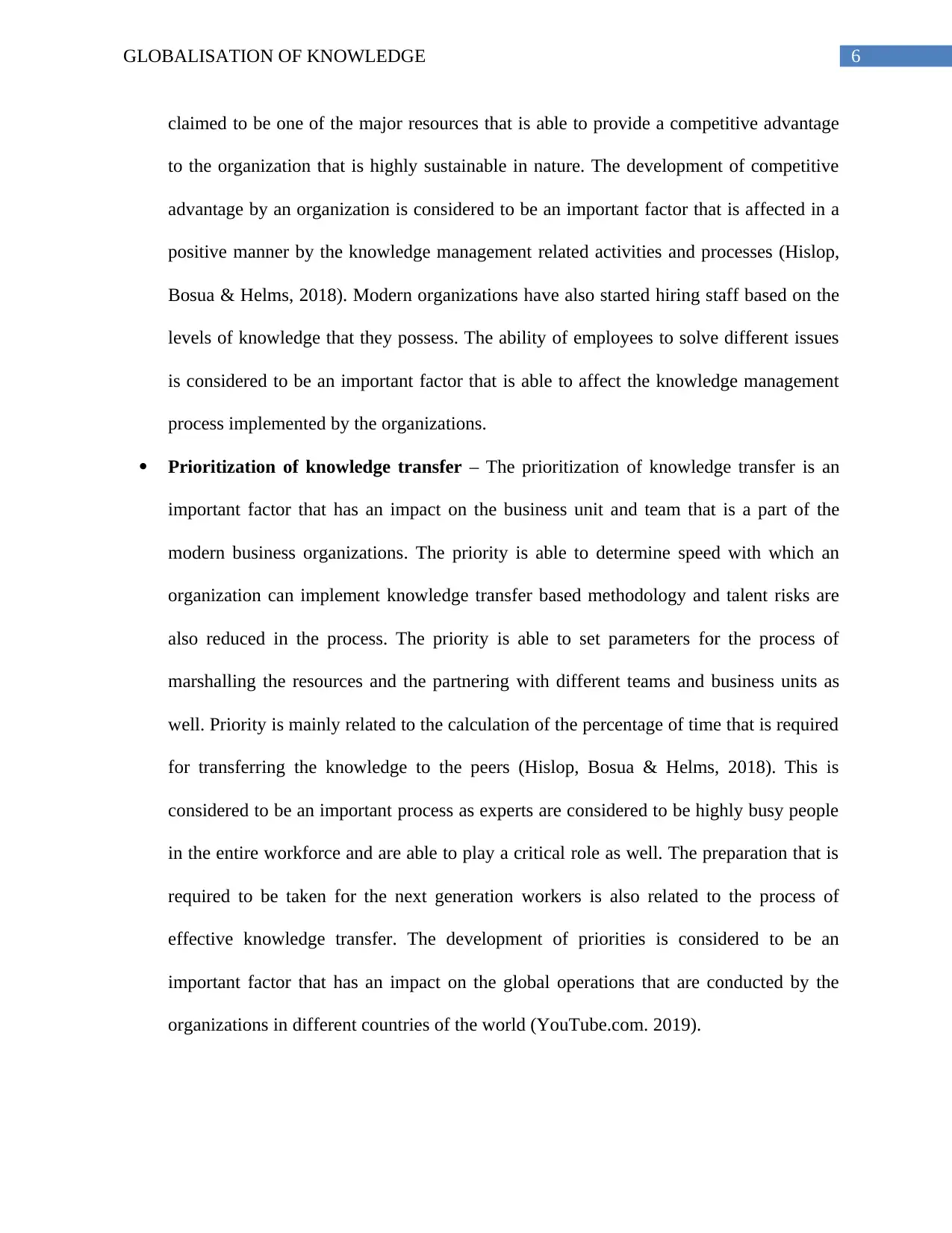
6GLOBALISATION OF KNOWLEDGE
claimed to be one of the major resources that is able to provide a competitive advantage
to the organization that is highly sustainable in nature. The development of competitive
advantage by an organization is considered to be an important factor that is affected in a
positive manner by the knowledge management related activities and processes (Hislop,
Bosua & Helms, 2018). Modern organizations have also started hiring staff based on the
levels of knowledge that they possess. The ability of employees to solve different issues
is considered to be an important factor that is able to affect the knowledge management
process implemented by the organizations.
Prioritization of knowledge transfer – The prioritization of knowledge transfer is an
important factor that has an impact on the business unit and team that is a part of the
modern business organizations. The priority is able to determine speed with which an
organization can implement knowledge transfer based methodology and talent risks are
also reduced in the process. The priority is able to set parameters for the process of
marshalling the resources and the partnering with different teams and business units as
well. Priority is mainly related to the calculation of the percentage of time that is required
for transferring the knowledge to the peers (Hislop, Bosua & Helms, 2018). This is
considered to be an important process as experts are considered to be highly busy people
in the entire workforce and are able to play a critical role as well. The preparation that is
required to be taken for the next generation workers is also related to the process of
effective knowledge transfer. The development of priorities is considered to be an
important factor that has an impact on the global operations that are conducted by the
organizations in different countries of the world (YouTube.com. 2019).
claimed to be one of the major resources that is able to provide a competitive advantage
to the organization that is highly sustainable in nature. The development of competitive
advantage by an organization is considered to be an important factor that is affected in a
positive manner by the knowledge management related activities and processes (Hislop,
Bosua & Helms, 2018). Modern organizations have also started hiring staff based on the
levels of knowledge that they possess. The ability of employees to solve different issues
is considered to be an important factor that is able to affect the knowledge management
process implemented by the organizations.
Prioritization of knowledge transfer – The prioritization of knowledge transfer is an
important factor that has an impact on the business unit and team that is a part of the
modern business organizations. The priority is able to determine speed with which an
organization can implement knowledge transfer based methodology and talent risks are
also reduced in the process. The priority is able to set parameters for the process of
marshalling the resources and the partnering with different teams and business units as
well. Priority is mainly related to the calculation of the percentage of time that is required
for transferring the knowledge to the peers (Hislop, Bosua & Helms, 2018). This is
considered to be an important process as experts are considered to be highly busy people
in the entire workforce and are able to play a critical role as well. The preparation that is
required to be taken for the next generation workers is also related to the process of
effective knowledge transfer. The development of priorities is considered to be an
important factor that has an impact on the global operations that are conducted by the
organizations in different countries of the world (YouTube.com. 2019).
Paraphrase This Document
Need a fresh take? Get an instant paraphrase of this document with our AI Paraphraser
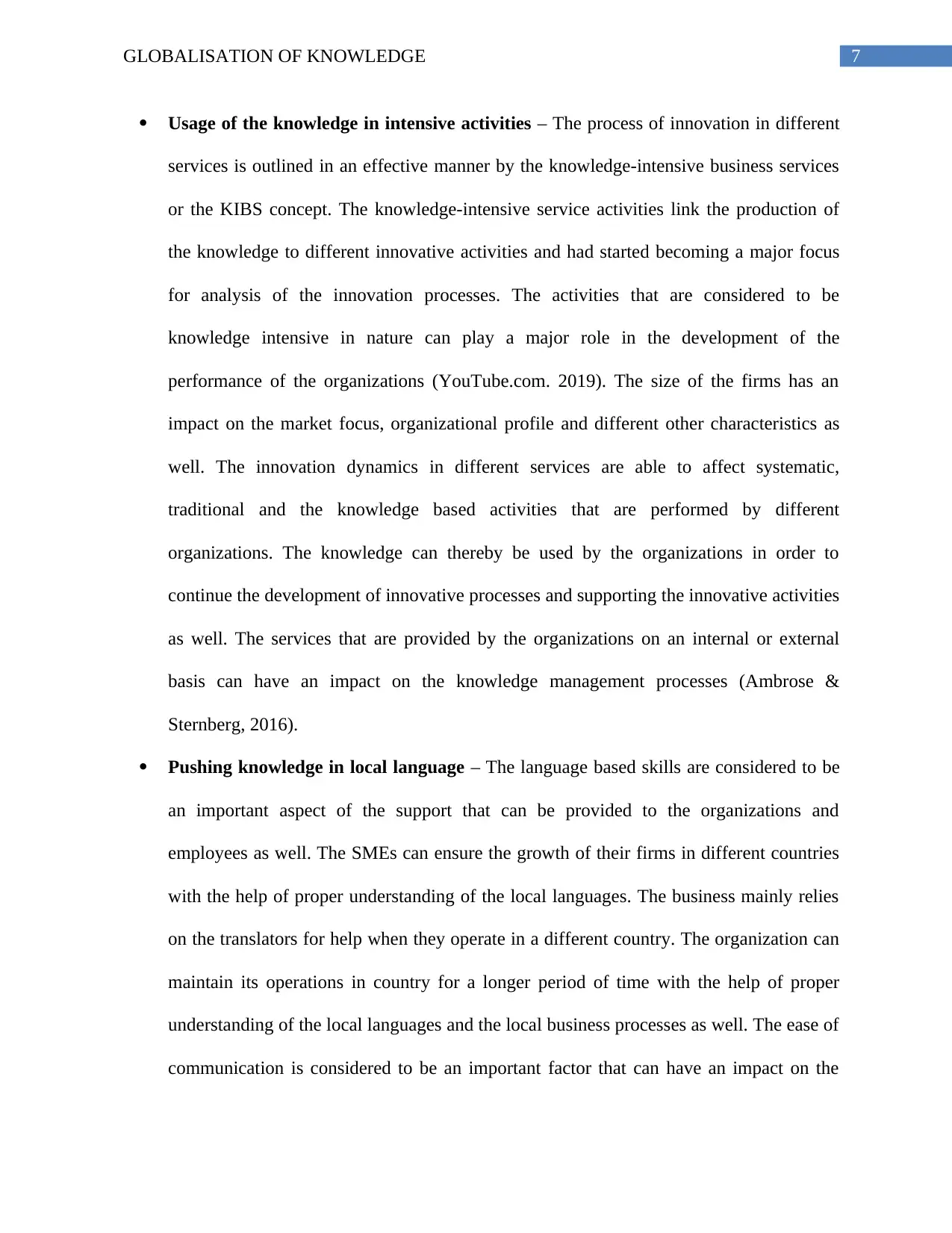
7GLOBALISATION OF KNOWLEDGE
Usage of the knowledge in intensive activities – The process of innovation in different
services is outlined in an effective manner by the knowledge-intensive business services
or the KIBS concept. The knowledge-intensive service activities link the production of
the knowledge to different innovative activities and had started becoming a major focus
for analysis of the innovation processes. The activities that are considered to be
knowledge intensive in nature can play a major role in the development of the
performance of the organizations (YouTube.com. 2019). The size of the firms has an
impact on the market focus, organizational profile and different other characteristics as
well. The innovation dynamics in different services are able to affect systematic,
traditional and the knowledge based activities that are performed by different
organizations. The knowledge can thereby be used by the organizations in order to
continue the development of innovative processes and supporting the innovative activities
as well. The services that are provided by the organizations on an internal or external
basis can have an impact on the knowledge management processes (Ambrose &
Sternberg, 2016).
Pushing knowledge in local language – The language based skills are considered to be
an important aspect of the support that can be provided to the organizations and
employees as well. The SMEs can ensure the growth of their firms in different countries
with the help of proper understanding of the local languages. The business mainly relies
on the translators for help when they operate in a different country. The organization can
maintain its operations in country for a longer period of time with the help of proper
understanding of the local languages and the local business processes as well. The ease of
communication is considered to be an important factor that can have an impact on the
Usage of the knowledge in intensive activities – The process of innovation in different
services is outlined in an effective manner by the knowledge-intensive business services
or the KIBS concept. The knowledge-intensive service activities link the production of
the knowledge to different innovative activities and had started becoming a major focus
for analysis of the innovation processes. The activities that are considered to be
knowledge intensive in nature can play a major role in the development of the
performance of the organizations (YouTube.com. 2019). The size of the firms has an
impact on the market focus, organizational profile and different other characteristics as
well. The innovation dynamics in different services are able to affect systematic,
traditional and the knowledge based activities that are performed by different
organizations. The knowledge can thereby be used by the organizations in order to
continue the development of innovative processes and supporting the innovative activities
as well. The services that are provided by the organizations on an internal or external
basis can have an impact on the knowledge management processes (Ambrose &
Sternberg, 2016).
Pushing knowledge in local language – The language based skills are considered to be
an important aspect of the support that can be provided to the organizations and
employees as well. The SMEs can ensure the growth of their firms in different countries
with the help of proper understanding of the local languages. The business mainly relies
on the translators for help when they operate in a different country. The organization can
maintain its operations in country for a longer period of time with the help of proper
understanding of the local languages and the local business processes as well. The ease of
communication is considered to be an important factor that can have an impact on the
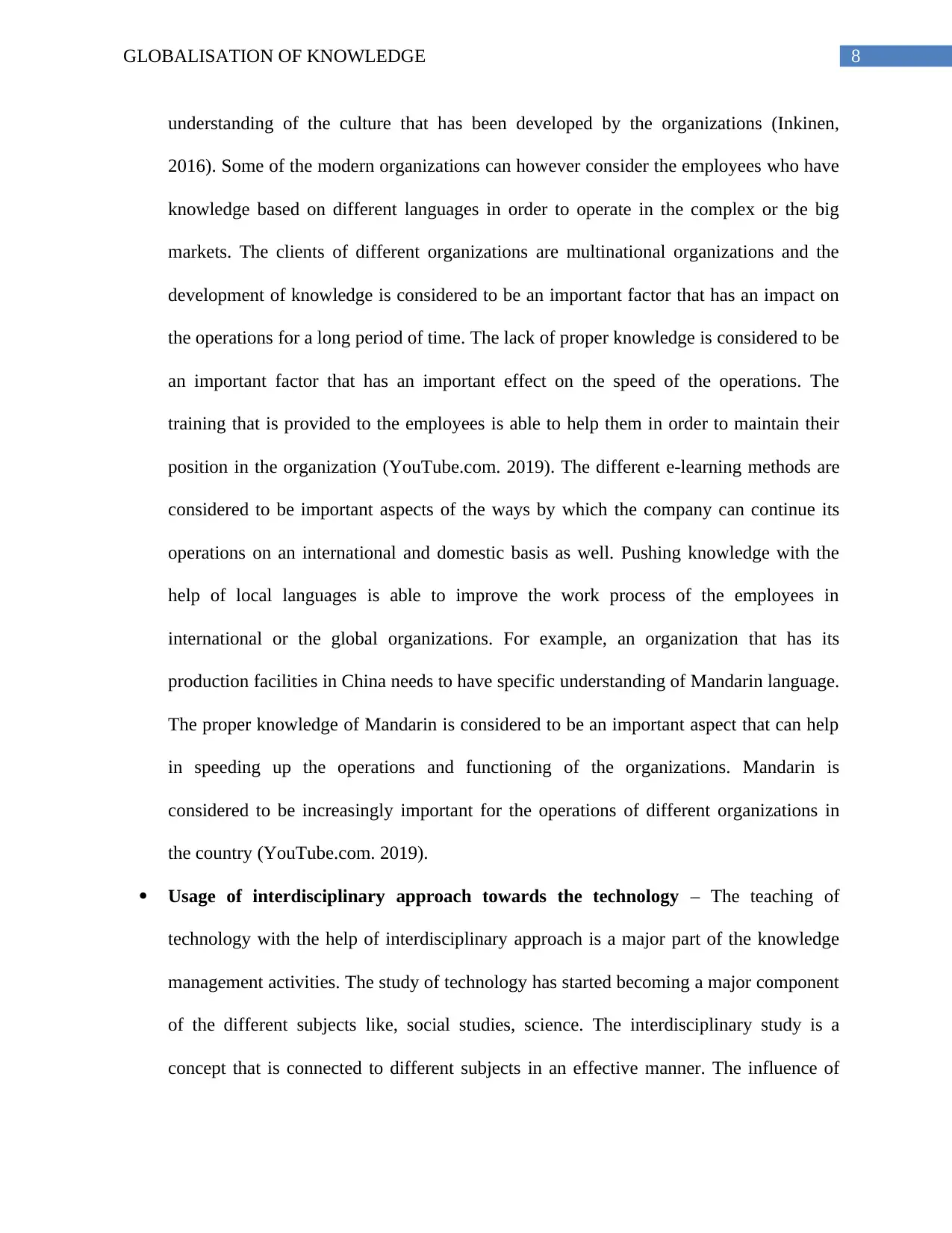
8GLOBALISATION OF KNOWLEDGE
understanding of the culture that has been developed by the organizations (Inkinen,
2016). Some of the modern organizations can however consider the employees who have
knowledge based on different languages in order to operate in the complex or the big
markets. The clients of different organizations are multinational organizations and the
development of knowledge is considered to be an important factor that has an impact on
the operations for a long period of time. The lack of proper knowledge is considered to be
an important factor that has an important effect on the speed of the operations. The
training that is provided to the employees is able to help them in order to maintain their
position in the organization (YouTube.com. 2019). The different e-learning methods are
considered to be important aspects of the ways by which the company can continue its
operations on an international and domestic basis as well. Pushing knowledge with the
help of local languages is able to improve the work process of the employees in
international or the global organizations. For example, an organization that has its
production facilities in China needs to have specific understanding of Mandarin language.
The proper knowledge of Mandarin is considered to be an important aspect that can help
in speeding up the operations and functioning of the organizations. Mandarin is
considered to be increasingly important for the operations of different organizations in
the country (YouTube.com. 2019).
Usage of interdisciplinary approach towards the technology – The teaching of
technology with the help of interdisciplinary approach is a major part of the knowledge
management activities. The study of technology has started becoming a major component
of the different subjects like, social studies, science. The interdisciplinary study is a
concept that is connected to different subjects in an effective manner. The influence of
understanding of the culture that has been developed by the organizations (Inkinen,
2016). Some of the modern organizations can however consider the employees who have
knowledge based on different languages in order to operate in the complex or the big
markets. The clients of different organizations are multinational organizations and the
development of knowledge is considered to be an important factor that has an impact on
the operations for a long period of time. The lack of proper knowledge is considered to be
an important factor that has an important effect on the speed of the operations. The
training that is provided to the employees is able to help them in order to maintain their
position in the organization (YouTube.com. 2019). The different e-learning methods are
considered to be important aspects of the ways by which the company can continue its
operations on an international and domestic basis as well. Pushing knowledge with the
help of local languages is able to improve the work process of the employees in
international or the global organizations. For example, an organization that has its
production facilities in China needs to have specific understanding of Mandarin language.
The proper knowledge of Mandarin is considered to be an important aspect that can help
in speeding up the operations and functioning of the organizations. Mandarin is
considered to be increasingly important for the operations of different organizations in
the country (YouTube.com. 2019).
Usage of interdisciplinary approach towards the technology – The teaching of
technology with the help of interdisciplinary approach is a major part of the knowledge
management activities. The study of technology has started becoming a major component
of the different subjects like, social studies, science. The interdisciplinary study is a
concept that is connected to different subjects in an effective manner. The influence of
⊘ This is a preview!⊘
Do you want full access?
Subscribe today to unlock all pages.

Trusted by 1+ million students worldwide
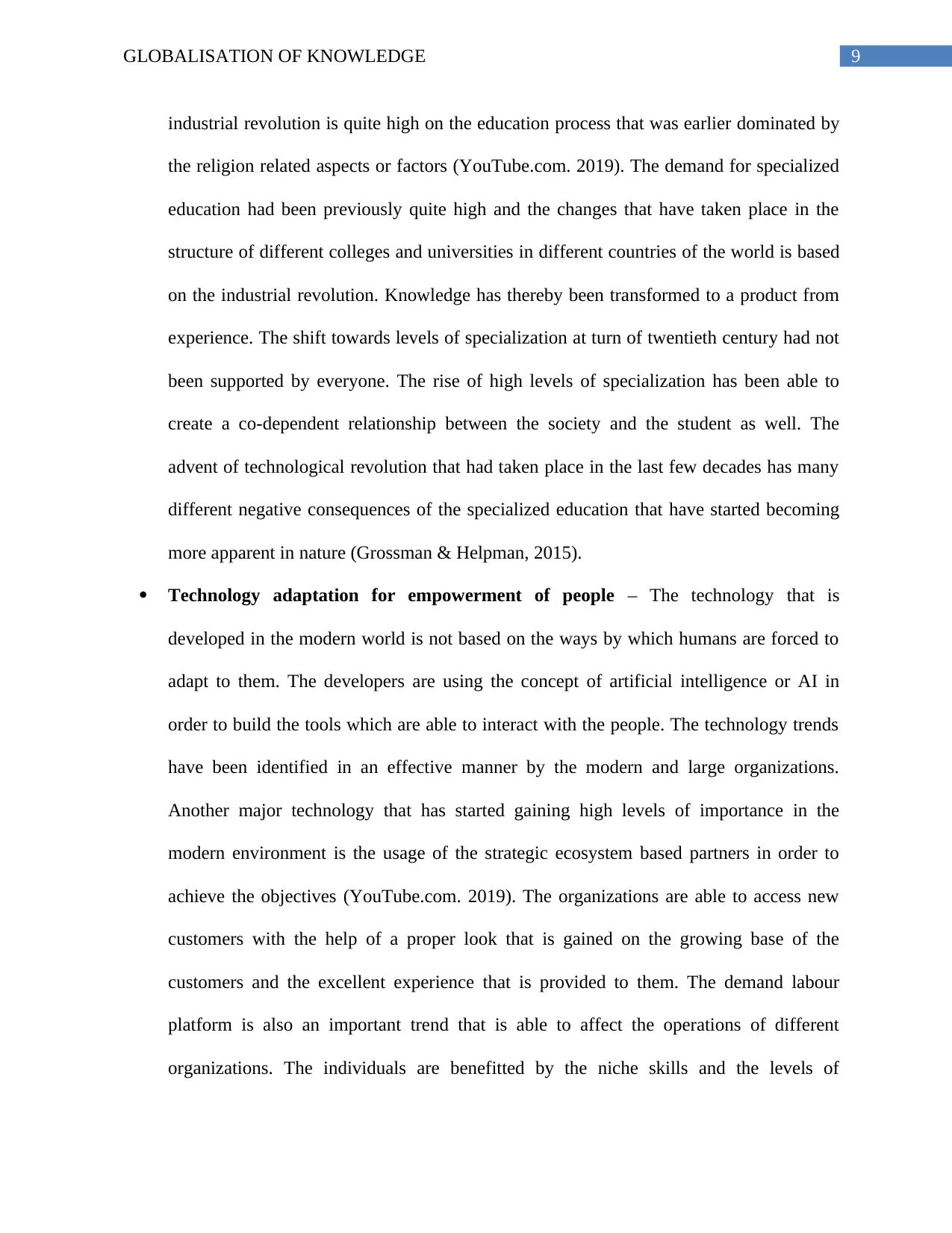
9GLOBALISATION OF KNOWLEDGE
industrial revolution is quite high on the education process that was earlier dominated by
the religion related aspects or factors (YouTube.com. 2019). The demand for specialized
education had been previously quite high and the changes that have taken place in the
structure of different colleges and universities in different countries of the world is based
on the industrial revolution. Knowledge has thereby been transformed to a product from
experience. The shift towards levels of specialization at turn of twentieth century had not
been supported by everyone. The rise of high levels of specialization has been able to
create a co-dependent relationship between the society and the student as well. The
advent of technological revolution that had taken place in the last few decades has many
different negative consequences of the specialized education that have started becoming
more apparent in nature (Grossman & Helpman, 2015).
Technology adaptation for empowerment of people – The technology that is
developed in the modern world is not based on the ways by which humans are forced to
adapt to them. The developers are using the concept of artificial intelligence or AI in
order to build the tools which are able to interact with the people. The technology trends
have been identified in an effective manner by the modern and large organizations.
Another major technology that has started gaining high levels of importance in the
modern environment is the usage of the strategic ecosystem based partners in order to
achieve the objectives (YouTube.com. 2019). The organizations are able to access new
customers with the help of a proper look that is gained on the growing base of the
customers and the excellent experience that is provided to them. The demand labour
platform is also an important trend that is able to affect the operations of different
organizations. The individuals are benefitted by the niche skills and the levels of
industrial revolution is quite high on the education process that was earlier dominated by
the religion related aspects or factors (YouTube.com. 2019). The demand for specialized
education had been previously quite high and the changes that have taken place in the
structure of different colleges and universities in different countries of the world is based
on the industrial revolution. Knowledge has thereby been transformed to a product from
experience. The shift towards levels of specialization at turn of twentieth century had not
been supported by everyone. The rise of high levels of specialization has been able to
create a co-dependent relationship between the society and the student as well. The
advent of technological revolution that had taken place in the last few decades has many
different negative consequences of the specialized education that have started becoming
more apparent in nature (Grossman & Helpman, 2015).
Technology adaptation for empowerment of people – The technology that is
developed in the modern world is not based on the ways by which humans are forced to
adapt to them. The developers are using the concept of artificial intelligence or AI in
order to build the tools which are able to interact with the people. The technology trends
have been identified in an effective manner by the modern and large organizations.
Another major technology that has started gaining high levels of importance in the
modern environment is the usage of the strategic ecosystem based partners in order to
achieve the objectives (YouTube.com. 2019). The organizations are able to access new
customers with the help of a proper look that is gained on the growing base of the
customers and the excellent experience that is provided to them. The demand labour
platform is also an important trend that is able to affect the operations of different
organizations. The individuals are benefitted by the niche skills and the levels of
Paraphrase This Document
Need a fresh take? Get an instant paraphrase of this document with our AI Paraphraser
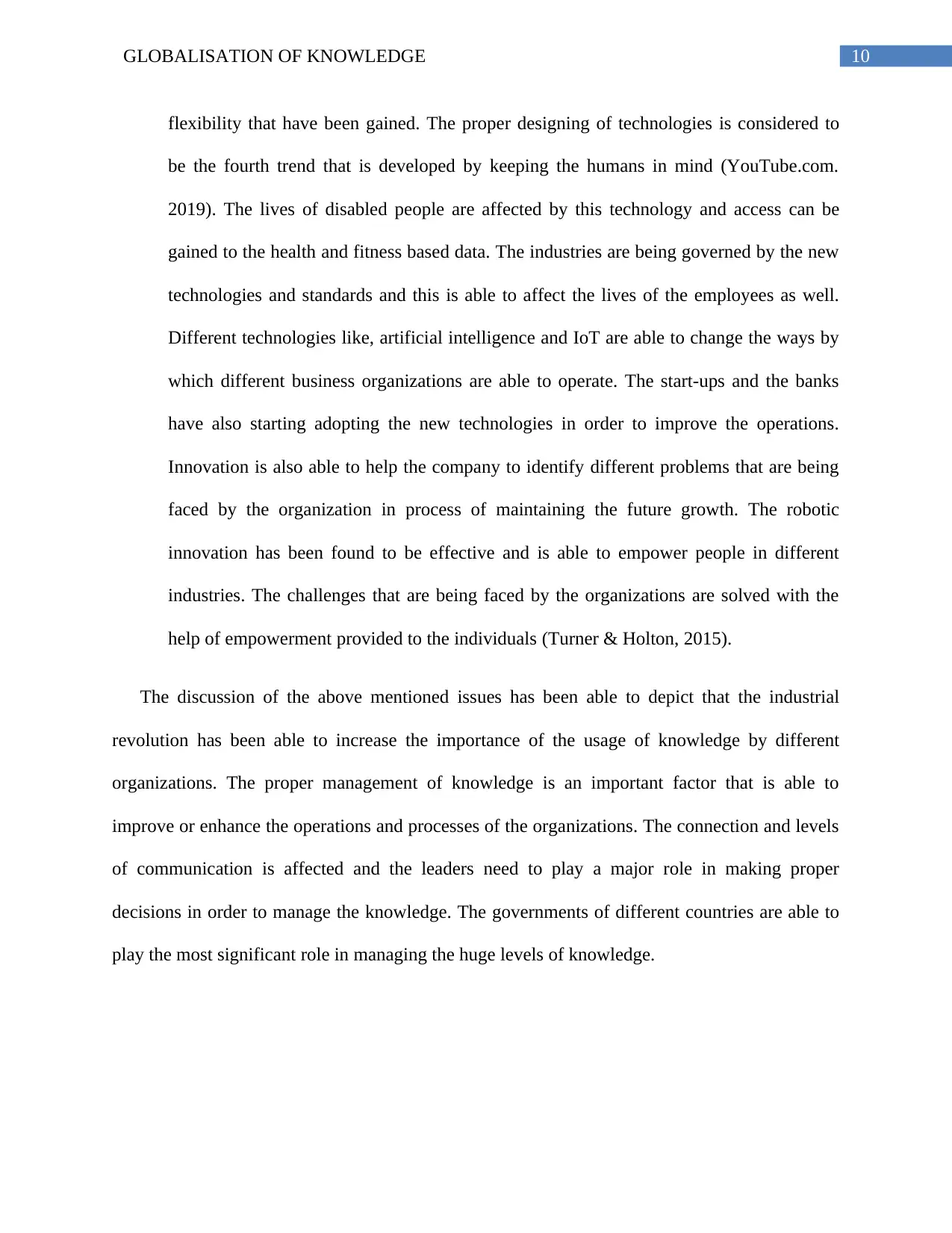
10GLOBALISATION OF KNOWLEDGE
flexibility that have been gained. The proper designing of technologies is considered to
be the fourth trend that is developed by keeping the humans in mind (YouTube.com.
2019). The lives of disabled people are affected by this technology and access can be
gained to the health and fitness based data. The industries are being governed by the new
technologies and standards and this is able to affect the lives of the employees as well.
Different technologies like, artificial intelligence and IoT are able to change the ways by
which different business organizations are able to operate. The start-ups and the banks
have also starting adopting the new technologies in order to improve the operations.
Innovation is also able to help the company to identify different problems that are being
faced by the organization in process of maintaining the future growth. The robotic
innovation has been found to be effective and is able to empower people in different
industries. The challenges that are being faced by the organizations are solved with the
help of empowerment provided to the individuals (Turner & Holton, 2015).
The discussion of the above mentioned issues has been able to depict that the industrial
revolution has been able to increase the importance of the usage of knowledge by different
organizations. The proper management of knowledge is an important factor that is able to
improve or enhance the operations and processes of the organizations. The connection and levels
of communication is affected and the leaders need to play a major role in making proper
decisions in order to manage the knowledge. The governments of different countries are able to
play the most significant role in managing the huge levels of knowledge.
flexibility that have been gained. The proper designing of technologies is considered to
be the fourth trend that is developed by keeping the humans in mind (YouTube.com.
2019). The lives of disabled people are affected by this technology and access can be
gained to the health and fitness based data. The industries are being governed by the new
technologies and standards and this is able to affect the lives of the employees as well.
Different technologies like, artificial intelligence and IoT are able to change the ways by
which different business organizations are able to operate. The start-ups and the banks
have also starting adopting the new technologies in order to improve the operations.
Innovation is also able to help the company to identify different problems that are being
faced by the organization in process of maintaining the future growth. The robotic
innovation has been found to be effective and is able to empower people in different
industries. The challenges that are being faced by the organizations are solved with the
help of empowerment provided to the individuals (Turner & Holton, 2015).
The discussion of the above mentioned issues has been able to depict that the industrial
revolution has been able to increase the importance of the usage of knowledge by different
organizations. The proper management of knowledge is an important factor that is able to
improve or enhance the operations and processes of the organizations. The connection and levels
of communication is affected and the leaders need to play a major role in making proper
decisions in order to manage the knowledge. The governments of different countries are able to
play the most significant role in managing the huge levels of knowledge.
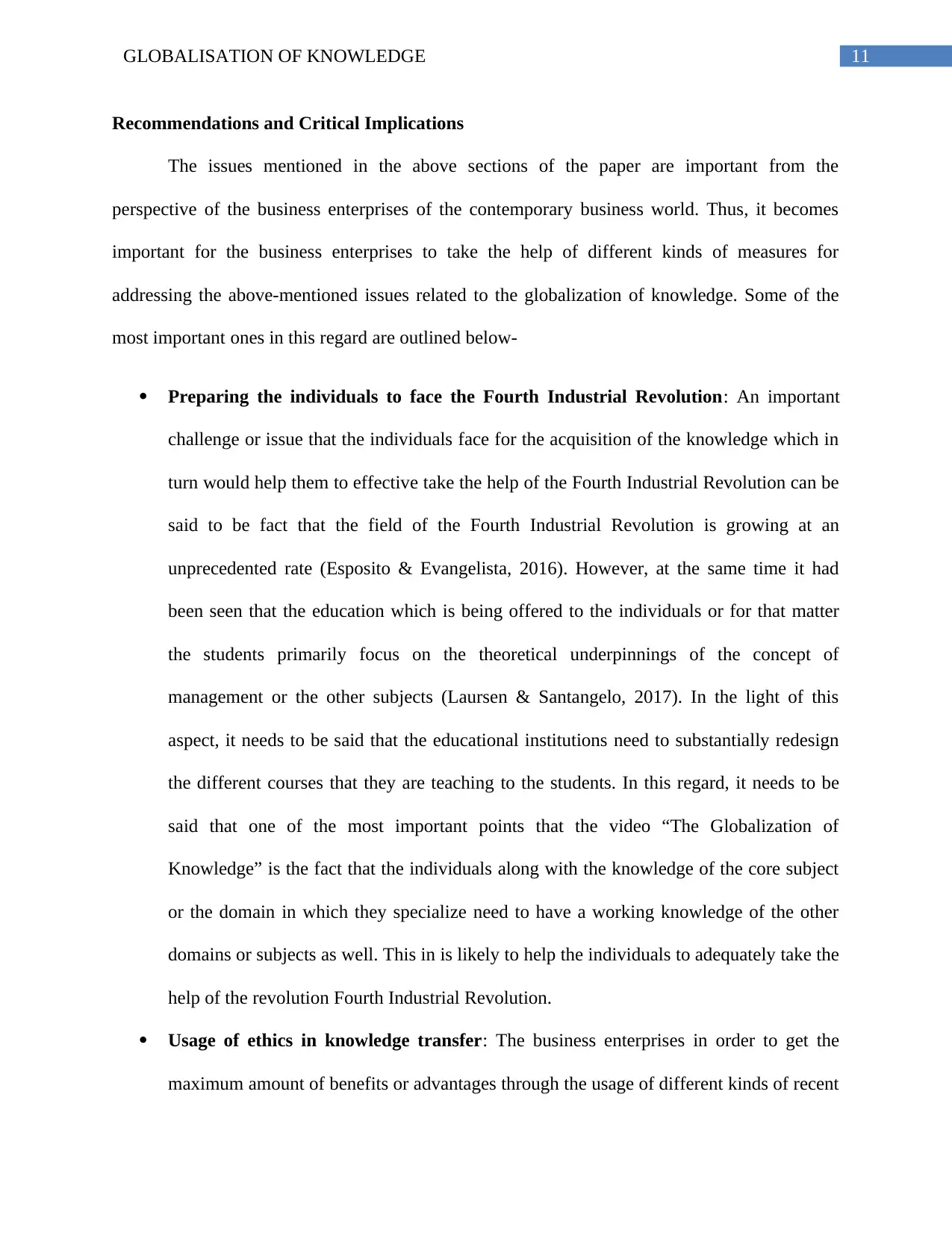
11GLOBALISATION OF KNOWLEDGE
Recommendations and Critical Implications
The issues mentioned in the above sections of the paper are important from the
perspective of the business enterprises of the contemporary business world. Thus, it becomes
important for the business enterprises to take the help of different kinds of measures for
addressing the above-mentioned issues related to the globalization of knowledge. Some of the
most important ones in this regard are outlined below-
Preparing the individuals to face the Fourth Industrial Revolution: An important
challenge or issue that the individuals face for the acquisition of the knowledge which in
turn would help them to effective take the help of the Fourth Industrial Revolution can be
said to be fact that the field of the Fourth Industrial Revolution is growing at an
unprecedented rate (Esposito & Evangelista, 2016). However, at the same time it had
been seen that the education which is being offered to the individuals or for that matter
the students primarily focus on the theoretical underpinnings of the concept of
management or the other subjects (Laursen & Santangelo, 2017). In the light of this
aspect, it needs to be said that the educational institutions need to substantially redesign
the different courses that they are teaching to the students. In this regard, it needs to be
said that one of the most important points that the video “The Globalization of
Knowledge” is the fact that the individuals along with the knowledge of the core subject
or the domain in which they specialize need to have a working knowledge of the other
domains or subjects as well. This in is likely to help the individuals to adequately take the
help of the revolution Fourth Industrial Revolution.
Usage of ethics in knowledge transfer: The business enterprises in order to get the
maximum amount of benefits or advantages through the usage of different kinds of recent
Recommendations and Critical Implications
The issues mentioned in the above sections of the paper are important from the
perspective of the business enterprises of the contemporary business world. Thus, it becomes
important for the business enterprises to take the help of different kinds of measures for
addressing the above-mentioned issues related to the globalization of knowledge. Some of the
most important ones in this regard are outlined below-
Preparing the individuals to face the Fourth Industrial Revolution: An important
challenge or issue that the individuals face for the acquisition of the knowledge which in
turn would help them to effective take the help of the Fourth Industrial Revolution can be
said to be fact that the field of the Fourth Industrial Revolution is growing at an
unprecedented rate (Esposito & Evangelista, 2016). However, at the same time it had
been seen that the education which is being offered to the individuals or for that matter
the students primarily focus on the theoretical underpinnings of the concept of
management or the other subjects (Laursen & Santangelo, 2017). In the light of this
aspect, it needs to be said that the educational institutions need to substantially redesign
the different courses that they are teaching to the students. In this regard, it needs to be
said that one of the most important points that the video “The Globalization of
Knowledge” is the fact that the individuals along with the knowledge of the core subject
or the domain in which they specialize need to have a working knowledge of the other
domains or subjects as well. This in is likely to help the individuals to adequately take the
help of the revolution Fourth Industrial Revolution.
Usage of ethics in knowledge transfer: The business enterprises in order to get the
maximum amount of benefits or advantages through the usage of different kinds of recent
⊘ This is a preview!⊘
Do you want full access?
Subscribe today to unlock all pages.

Trusted by 1+ million students worldwide
1 out of 27
Related Documents
Your All-in-One AI-Powered Toolkit for Academic Success.
+13062052269
info@desklib.com
Available 24*7 on WhatsApp / Email
![[object Object]](/_next/static/media/star-bottom.7253800d.svg)
Unlock your academic potential
Copyright © 2020–2026 A2Z Services. All Rights Reserved. Developed and managed by ZUCOL.




